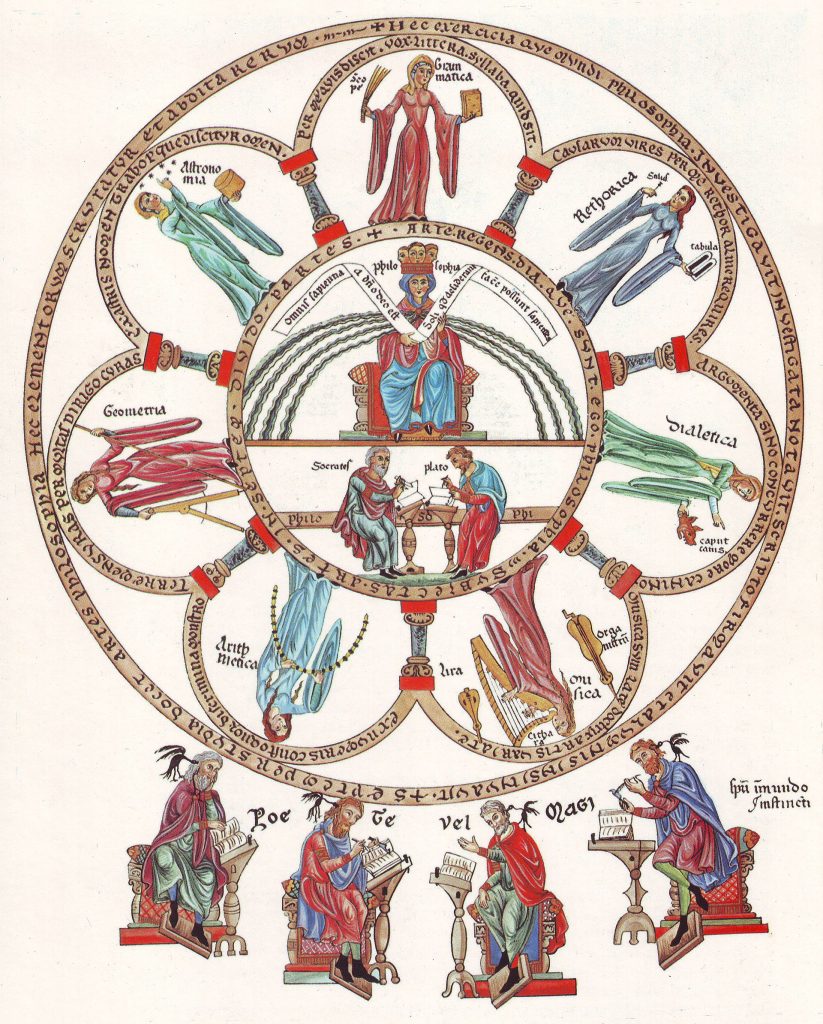AFTER
- reading: Old Woman, authorial retraction, other knowledge outside the liberal arts (medicine, theology, law) and academe, applied knowledge in practice / everyday life in the actual material temporal world (Roman de la Rose 193-227, 234-36)
- the 14th century and later… from Christine de Pizan and the Querelle to Francis I and the Collège de France, Rabelais, Montaigne, and a second dream vision: that of educational utopias…
and parallels earlier, later, and elsewhere outside Europe…
TUESDAY
1 Discussion of blog questions and comments on week 10
Soundtrack: Hildegard of Bingen, The Origin of Fire – Music and Visions (Anonymous 4) https://m.youtube.com/watch?v=Q8gK0_PgIgY
—, Canticles of Ecstasy (Sequentia) https://m.youtube.com/watch?v=Ei88J4lERbk
2 Survival, subversion, and satire
- alternatives and supplements to university education (1):
—during “our” period: religious institutions, private tutors, schools, apprenticeships, the other university faculties (after a first degree in Arts), Béguines & adult/lifelong education
—up to the 21st c.: libraries, prisons, liberal arts colleges & the Historical Black Colleges (ex. Howard), the Open University
THURSDAY
1 The aftermath of the Roman de la Rose:
- the parallel continuum of oral literature and culture:
—memory
—Performing Medieval Narrative project - alternatives and supplements to university education (2):
—16th c. developments: François 1er and the Collège de France (Paris),
—the Reformation and educational reform (ex. from England and Scotland)
—“underground” hedge schools (Ireland) - other alternatives:
—other utopian dream-visions: Machaut, Froissart, Piers Plowman, Christine de Pizan, More, Rabelais, Montaigne
—early 16th c. imaginary utopian educations: we saw examples from the fictions of François Rabelais (extracts from Pantagruel and Gargantua) and Thomas More (Utopia); placing these two writers in a context and literary & intellectual (ideas) continuum of which the Roman de la Rose is a key part
2 Reading (in/of/and) the Roman de la Rose:
- the Debate inc. Christine de Pizan
—problems for 14th-15th c reader-critics: inappropriateness and obscenity (Reason, the ending), blasphemy (Genius), irresponsible immoral bad advice (Reason, Friend, Old Woman), misogyny (ditto, the latter two)
—extracts from Aristotle and Horace on appropriateness - examples of what Old French verse looks and sounds like, feat. truffles et fanffelues (l. 20356)
- what’s the point of it all?
—Mirrors of Princes; thinking and rethinking education; comparative gardens and mirrors in the Roman de la Rose; reading and rereading (and wary care and scepticism) in the Roman de la Rose
—authorial retractions and satire: what is your judgement, as good readers?
(This is a genuine open question.)
TEXTS & READINGS:
- The aftermath of the Roman de la Rose (1)
- (2): Excerpts from the Roman de la Rose debate
- (3) BONUS EDUCATIONAL PARATEXTUALITY:
comedy list of books in the Library of St-Victor, Paris (Rabelais, Pantagruel) + prefaces to Pantagruel, Gargantua, The Third Book of Pantagruel, & The Fourth Book of Pantagruel
